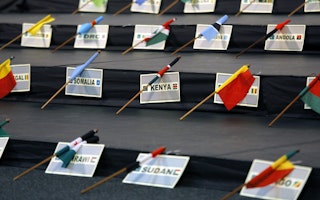In Angola, a Brutal Silencing of Dissent
By Elias Isaac
In May 2012 two Angolan activists, António Alves Kamulingue and Isaías Sebastião Cassule, disappeared after being involved in organizing a protest for fellow retired soldiers to try and reclaim unpaid pensions.
Over the past 18 months, the Open Society Initiative for Southern Africa joined many other local and international organizations calling on the Angolan government to investigate the whereabouts of these two men.
So it is with deep sadness—and a lot of anger—that we are now presented with the grim news that Kamulingue and Cassule will never be reunited with their families because they are dead—brutally murdered by those who had the obligation to protect them.
It is claimed they were tortured by agents from Angola’s State Intelligence and Security Service of Angola (SINSE) and that their bodies were dumped into a crocodile-infested river in order erase all the evidences of the monstrous act.
The leaking of a confidential dossier detailing the kidnapping, torture, and murder of the two men has confirmed our worst fears about the barbarity of a government that will stop at nothing to repress and silence citizens' demands and criticisms.
Although the details of this report remain unconfirmed, the Angolan attorney general did issue a statement last week to say: “Given the evidence collected, it became practically proven that the two missing citizens were kidnapped…Their whereabouts are still unknown, and the possibility that they were victims of murder has not been discarded.”
And in the last week, the head of SINSE, Sebastião José António Martins, has been fired, and three of his agents as well as a staff members from the Angolan Criminal Investigation Department are in custody.
This tragedy highlights the dysfunctional and anarchic way in which the security and intelligence services are being run in Angola. Even during times of supposed democracy, the authorities have no minimum regard and respect for human lives and believe in discarding citizens in such primitive and cruel manners.
The bottom line is that those who savagely executed Cassule and Kamulingue must surely have been acting in line with the wishes of higher authorities and the only recognized and absolute authority this country has is the president, who commands and controls everyone and every state institution. There is a military saying: “There are no bad soldiers, only bad commanders.”
These institutions see free-minded citizens as enemies of the president and the political establishment who must be eliminated. These bodies have not yet transformed themselves into state service institutions. They still remain ideologically entrenched within the political control of the ruling party and continue to be systematically used as instruments of repression, intimidation, and assassinations.
Angola is far from being a pluralistic democracy because of the political intolerance exhibited by members of the ruling party, the security forces, and national police, which is directed against citizens belonging to the opposition or simply dissenting and contesting voices.
Democracy is only constructed on the foundations of political tolerance and the acceptance of different views, beliefs and people’s right to support parties of varying political persuasions. The ruling MPLA party—in power in Angola for the last 37 years—does not believe in tolerance or plurality. It believes in the physical, moral, and economical elimination of everyone who is different, looks different, speaks differently and thinks differently.
Before April 2002, we could swallow almost all kinds of atrocities and brutal assassinations that were committed—because of the war. But today, no Angolan in their right mind—regardless of political party or religious affiliation—should accept political kidnappings, killings, and assassinations.
It is not acceptable because peace was achieved at a high cost and was meant to end violence and these kinds of vicious assassinations. It is not acceptable now, and the ruling MPLA must feel ashamed of itself for not condemning the killings of Angolan citizens just because they are not on the party’s membership roll.
This is a political disgrace for the ruling party and the president.
Unfortunately, all the talk about Angola's soaring economic growth will never translate into real democratic development and respect for basic human rights—including the most fundamental of all, the right to life—with our current political establishment.
Elias Isaac is Angola country director for the Open Society Initiative for Southern Africa.


